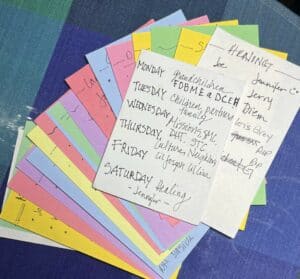It felt like nothing was wrong. We sat, as we’d done many times, together – taking in a touching film.

“I’ve seen this one before.” He said quietly.
“Oh, we can watch something else.” I replied.
“No, no it’s fine. It’s good. I’d love to watch it with you.” He said contentedly.
Sweet I thought. Movies were a big part of my childhood. My parents weren’t readers, they were watchers. Probably the reason why I was drawn to theater and my brother to film.
My brother had convinced my Dad to get a 58” TV for his small room in the assisted living facility where he now lived. I thought overkill, but today this huge screen surrounded us. My Dad and I were drawn into an epoch story of the Roman Tribune who was responsible for the crucifixion of Christ.
These last few weeks he often fell asleep as we watched anything on TV, but not today. Today he was alert, engaged and comfortable. The film was excellent in its quality; incredible cinematography, realistic costumes and set, accurate, yet creative adherence to the story. But it was the acting that struck me. It was outstanding.
As is our way we made gentle comments, one to another, as the story unfolded, and as the characters grew in their understanding of what Christ was doing.
For a moment there was a rest from the chaos and sadness of his terminal condition. Together – today – as we had been so many times in his seasons of good health.
I felt a warmth, a hint of joy, which slowly turned to sadness as I remembered why we were there and not at his home.
I regained my focus on the present moment and relaxed into the calm that surrounded us. For a few hours Death waited outside the door and we were safe.



